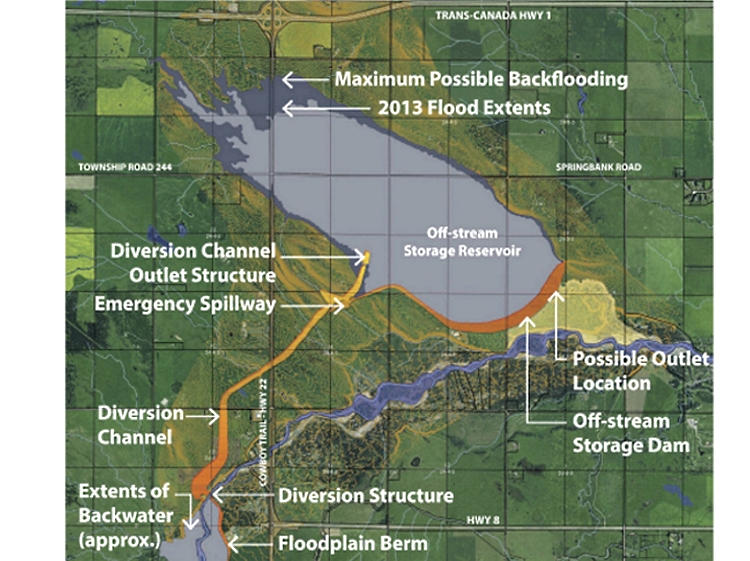Officials of the City of Calgary and Calgary River Communities Action Committee are in an uproar over Rocky View County's called for the Alberta government to halt the SR1 process and go back to the drawing board to give equal consideration to other Elbow River flood mitigation options available.
As of yesterday, though, County Reeve Greg Boehlke says he hadn't received any further feedback from city officials, including Mayor Naheed Nenshi, on the decision reached Dec. 11 by RVC council and he stands behind the move to oppose the current Springbank Dry Reservoir proposal.
"I’ve actually had phone calls, texts and emails today (Dec. 12) about what an excellent report it was," says Boehlke. "and how it was one of the most thorough and balance reports completed that asks a lot of good questions."
"I’m pleased council supported the report wholeheartedly. We don’t support the dry dam process, the SR1, right now as it’s written and we want the government to look at all the alternatives and make sure it’s done right."
The extensive report on the SR1 prepared by Richard Barss, RVC intergovernmental affairs manager, concludes proper consideration wasn't given to other viable flood mitigation options as well as the future potable water and recreational needs of the Calgary region. It also concludes First Nations were not appropriately engaged.
The report points out the SR1 squarely places the burden of providing flood protection for Calgary on the shoulders of Rocky View County residents and does little to protect them or their properties.
Among those saluting the RVC decision is the Don't Damn Springbank organization that has been battling to overturn the SR1 proposal since it was first announced in October 2015.
Ryan Robinson, of the organization, is impressed with the RVC report and says it gives validity to what they've been pointing out all along.
"Anything that we can say is not as powerful as the fact that the county spent a lot of time and money and resources studying the issue and this is the conclusion they came up with," says Robinson.
"Every time the issue gets studied, more and people understand it better and it becomes more and more obvious it is a wrong-headed solution. It's clear they have made a bad decision and the sooner they back off on it the better everybody will be, including Calgary."
"We’re very proud and also very impressed with the county. They’ve obviously got their priorities right, which is to look after the residents of Rocky View."
A day prior to the presentation of the report to RVC council, Calgary Mayor Nenshi sent a letter to Boehlke stressing the importance of SR1 to Calgary and encouraged the council to vote against adopting the report's position. He stressed its been 5 1/2 years since the crippling flood of 2013 and further delaying SR1 is a risk Calgary simply can't afford.
"The time for reconsideration of other projects or significant changes int he direction of SR1 has long passed, given the lengthy project planning and approval processes both provincially and federally," states the letter.
The SR1 project is in the midst of a federal regulatory review and the Alberta government is preparing answers to the hundreds of questions asked.
Despite this, Transportation minister Brian Mason recently stated in the legislature that the government intends to meet its self-imposed deadline of systematically and rigorously answering all of these questions by the end of December. SR1 is currently scheduled to be completed in spring 2022.
The $432-million reservoir will require about 3,870 acres of land and will directly impact 87 residential properties and the Kiwanis summer camp. It is designed to divert water from the Elbow River and retain it during flood events. When filled, the reservoir would flood the Springbank Road and move westward underneath an elevated Hwy. 22.




